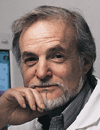Stephen Baylin
Deputy Director, Johns Hopkins University School of MedicineStephen B. Baylin, M.D., is deputy director of The Sidney Kimmel Comprehensive Cancer Center at Johns Hopkins and the Virginia and D.K. Ludwig professor of oncology and medicine. He is chief of the Cancer Biology Division and associate director for research of the center.
Baylin attended Duke University, where he earned his medical degree in 1968 and completed his internship and first year residency in internal medicine. He then worked for two years at the National Heart and Lung Institute of the National Institutes of Health (NIH). In 1971, Baylin joined the departments of oncology and medicine at Johns Hopkins University School of Medicine.
His research interests include cellular biology and genetics of cancer, specifically epigenetics or genetic modifications other than those in DNA that can affect cell behavior, and silencing of tumor suppressor genes and tumor progression. His research has looked at the mechanisms through which variations in tumor cells derive, and cell differentiation in cancers such as medullary thyroid carcinoma and small cell lung carcinoma.
Baylin’s honors include the 2004 National Investigator of the Year Award from the NCI SPORE program; the 2005 Jack Gibson Visiting Professorship, University of Hong Kong Queen Mary Hospital, Hong Kong; the 2005 Shubitz Cancer Research Prize from the University of Chicago; the 2008 Raffaele Tecce Memorial Lecture, Rome, Italy; the 2008 David Workman Memorial Award from the Waxman Foundation; and the Kirk A. Landon-AACR Prize for Basic and Translational Cancer Research.
Baylin has served on the American Association for Cancer Research Board of Directors from 2004 through 2007, and is an associate editor of Cancer Research. He has also presented frequently at AACR conferences and chaired the special conference on "DNA Methylation, Imprinting and the Epigenetics of Cancer." Baylin has authored or co-authored more than 350 publications. |  | | | Ingrid Grummt
Head, German Cancer Research CenterIngrid Grummt received her PhD at the Humboldt-University in Berlin, worked as a Postdoc at the Max-Planck-Institute of Biochemistry in Munich, led a research group in Würzburg, and is Division Head at the German Cancer Research Center in Heidelberg since 1989. Her research focuses on the molecular mechanisms that regulate transcription. She serves on several scientific advisory boards and is a member of EMBO, the Academia Europea and the German Academy of Sciences Leopoldina. She has received numerous awards, including the Science Prize of the Fritz-Winter-Foundation, the Gottfried Wilhelm Leibniz-Prize and the 2010 EMBO/FE BS Women in Science Award |  | | | Peter Meyer
Professor, Leeds UniversityPeter Meyer has been a Professor of Plant Epigenetics at the University of Leeds since 1995. He obtained his PhD in 1986 from the University of Cologne, and worked as a Postdoc with Heinz Saedler at the Max-Planck-Institute for Breeding Research in Cologne. In 1989 he became an independent group leader at the Max-Delbrueck Laboratory within the Max-Planck-Society before moving to Leeds. His work originally focused on transgene-specific gene silencing effects in plants. His research contributed in particular to the discovery of methylation states being imposed from the chromosomal integration region onto the transgene and the induction of hypermethylation and transgene silencing by environmental stress. The research also highlighted chromatin accessibility as a hallmark for the epigenetic state of a transgene, it confirmed the presence of a cytosine methylation system in plants that targets C-residues outside symmetrical CG contexts, and it led to the discovery of an overlapping co-operative control system for CG and non CG methylation by three DNA methyltransferases. The work then shifted towards a search for endogenous epigenetic systems, identifying signal regions for de novo DNA methylation, and towards the examination of natural antisense transcripts (NATs) as regulators of sense gene expression, which led to the discovery of a novel class of small RNAs in petunia, and the identification of alternative polyadenylation and antagonistic gene expression as evolutionary strategies to avoid antisense effects. In his recent work, he uses plant mutants to compare plants and mammalian DNA methylation functions. |  | | |
|

 Add to Calendar ▼2012-09-04 00:00:002012-09-05 00:00:00Europe/LondonEpigenetics EuropeSELECTBIOenquiries@selectbiosciences.com
Add to Calendar ▼2012-09-04 00:00:002012-09-05 00:00:00Europe/LondonEpigenetics EuropeSELECTBIOenquiries@selectbiosciences.com